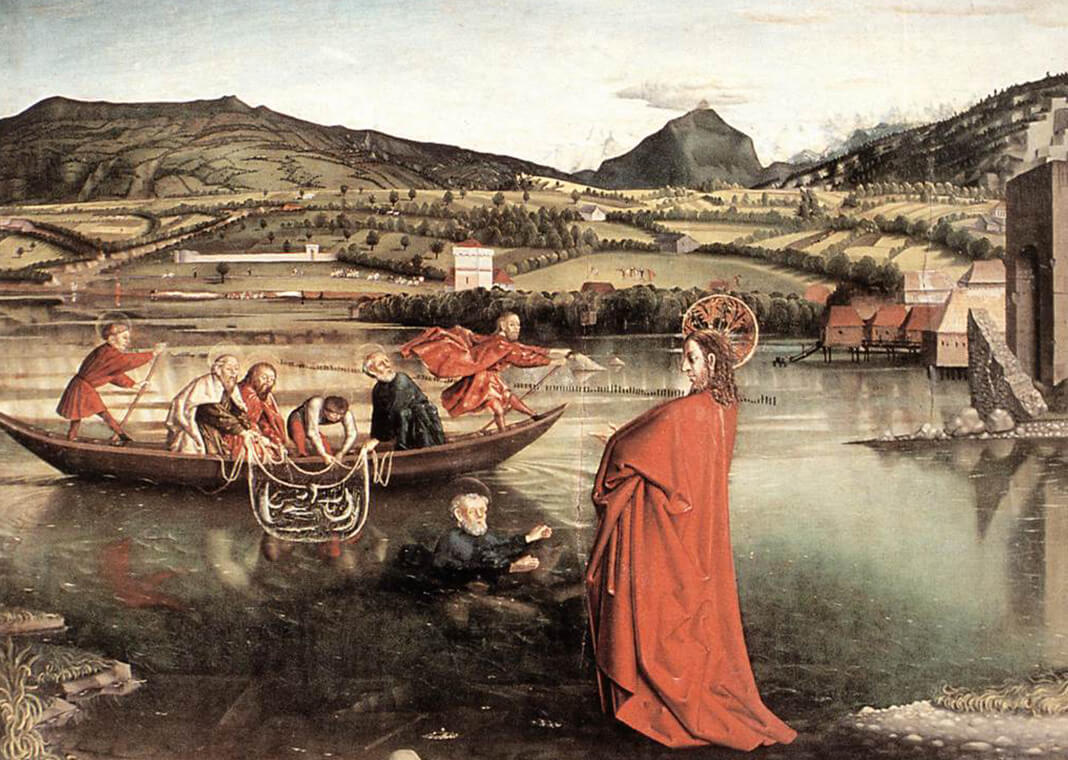
Mary Magdalene stands at the empty tomb: how could she not weep, filling the well of her sorrow that capped her grief over the last three days?
She notices a figure nearby, someone she can hardly see through her tired and streaming eyes. Humbly she pleads with him to be shown where the precious body of her Lord has been taken.
As this stranger speaks her name, she is wild with the joy of recognition: it is he, here, in front of her! She throws herself at his feet—not that she needs to touch him to prove that he is real and in the flesh, but because she never wants to be separated from him.
No, you mustn’t cling, you mustn’t hold me back. I’m not going anywhere yet, for we still have work to do. Go to my brothers to tell them I’m alive and that I’ll meet them in Galilee.
The brothers are incredulous at first: is Mary really trustworthy? Yet they also know of their Lord’s warm friendship with her. But when the Apostles are gifted with seeing him twice in the room where they’re hiding, there’s no more doubt. They obey Jesus’ request to meet him at the Sea of Galilee. Now at the end, they return to his beginning.
They wait on the shore. Nothing is happening. Where is he?
Peter, impatient for action, announces: “I’m going fishing.” The others, including James and John, follow his lead.
Do you remember how it all started? Back then, we were also fishing. He came and called us: “Come with me! I’ll make you fishers of men!” What a glorious future was ahead for us! To become the chosen followers—and even friends of the Messiah himself! What great hopes we had. And look how it has all ended. He’s arrested, condemned, and crucified. There’s nothing more for us. Our dreams of glory are dead. His dream of glory is dead. Our lives are nothing, nothing but fishing. And we can’t even catch fish today, much less admiration from others.
A voice calls across the water: “Young men, have you caught anything?”
No, not a thing all night.
“Try casting your nets on the other side; you’ll find something.”
That doesn’t make sense! What does he know about fishing? Then it dawns on them. That voice, like an echo of a command once heard three years ago, when he had come into their boat to preach from there. That time, he told them the same thing: “Cast your nets on the other side.” And they caught more than they could haul into the boat.
Remembering this event, John takes another look at the man on the shore. It is the Lord!
Why this failure to recognize Jesus? Mary Magdalene and the Apostles had been with him almost daily for over three years. Why didn’t they know him?
Could it be they had other expectations? Maybe they expected that, resurrected, he’d have a glow around him, or some appearance more like what they expected of the Messiah—kingly, perhaps. But here he was, still ordinary looking—if anything, more ordinary than he was before. They had hoped that, now vindicated, he would look powerful and, well, glorious, as he had looked when transfigured on Mount Tabor. If he had looked like that, everyone would know beyond the shadow of a doubt that he was truly the Messiah, the Son of God.
But no. Christ does not make himself known so easily as that. He can be seen only by the eyes of the heart that longs to know him. Like his Father in the old days, Jesus often remains hidden in a cloud or a whisper.
Cast your nets on the other side. Try something different. Stop doing the same old things that never got you anywhere. Change! Try something new, such as what I’ve been teaching you all these years.
Those who ponder his words, who sincerely follow and rely on Jesus, gradually come to recognize him. They know what he looks like and are not scandalized by his everyday appearance. He looks like you. He looks like me. We recognize him as we care for one another in him.
—
Image: Konrad Witz, The Miraculous Draught of Fishes, 1444

Yes of course! Try something new such as what I have been teaching you all these years! Of course. Why have I been so blind? Thank you